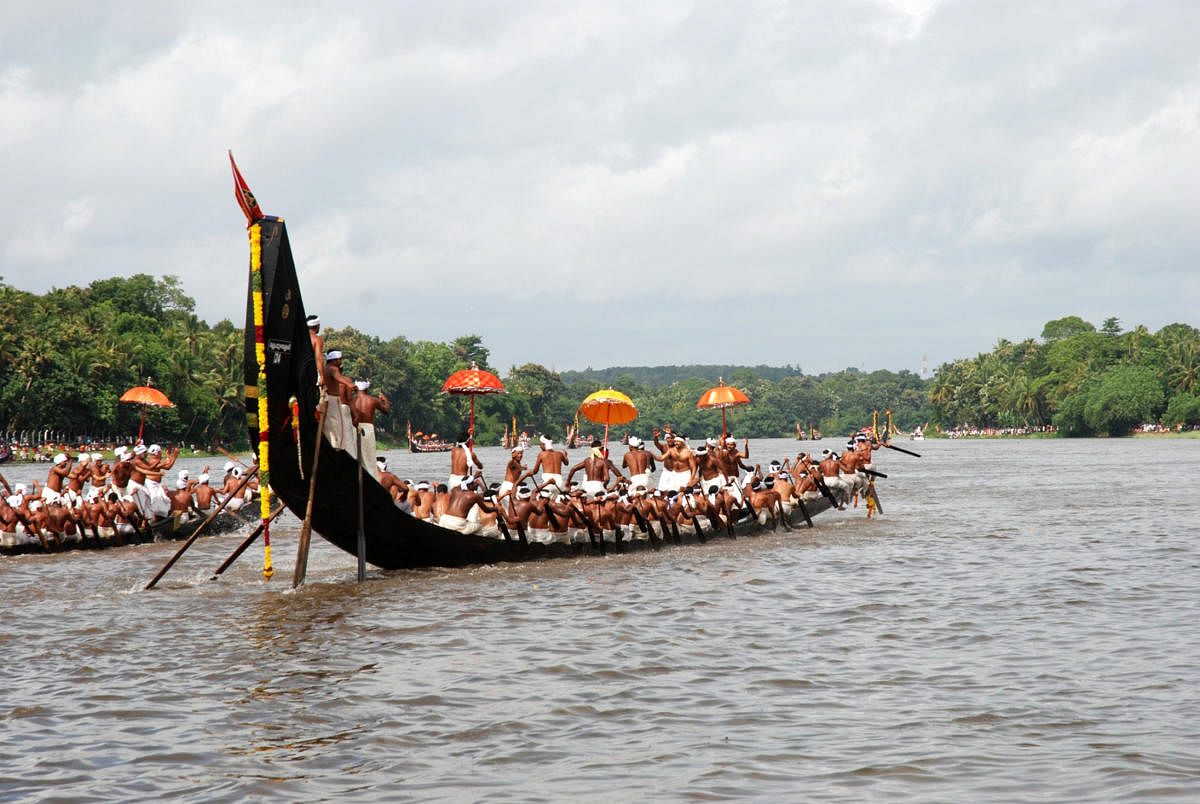
Come monsoon and the serene backwaters of Kerala come alive with the annual boat races. It resonates with the chants of ‘thai thai thaka thaka thai thom’, when the oarsmen splash their oars in unison with the fast rhythm of the vanchipaattu (boat song). The genesis of the boat races can be traced back to the time when boats were used for post-harvest water wars by the warring kings of the backwaters. These traditional boats were later used for religious pageants during the onam season. From water wars to temple rituals to annual boat races, the boats have traversed a long way. Initially, these water regattas were sans any element of competition, but now the participating groups vie with each other to lift the coveted trophy.
An overview
The races start with the Champakulam Boat Race, the oldest boat race in Kerala, which celebrates the arrival of the idol of Lord Krishna at Sri Krishna Temple in Ambalappuzha. The race is held in the Champakulam Lake on the moolam day of the Malayalam month midhunam, the day of the installation of the deity at the temple. This is followed by Nehru Trophy Race, then Payippad Jalotsavam, and so on. The three-day annual fiesta in the Payippad Lake, 35 km from Alappuzha, commemorates the installation of the deity at the Subramanya Swamy Temple, Haripad.
Nehru Trophy Boat Race
But my favourite boat race is the Nehru Trophy Boat Race, the biggest water regatta held in the Punnamada Lake off the town of Alappuzha, on the second Saturday of August. The competitive fever started when a race was organised for the visit of India’s first prime minister, Jawaharlal Nehru. He was so fascinated with races that he evaded the security cordon and leapt into the winning boat. On his return to Delhi, he sent a silver trophy, a replica of a snake boat with an inscription, ‘To the winners of the boat race which is a unique feature of community life in Travancore-Cochin’. This trophy has ever since been presented each year to the champion chundan vallam (snake boat).
Beginning in July, the villages throughout Kerala’s backwaters devote all their attention to the preparation for the Nehru Trophy Race. The villagers take pride in their boat, which represents their village and is named after it. The sense of belonging to their village is palpable.
Huge amounts are spent on the upkeep of the boats and for participating in the boat race, with contributions from the villagers. Villagers partake in the feeding, coaching and preparations of these modern water-warriors. The participants are fed on a special diet of roasted beef, onion salad, groundnut and black tea. Rituals and pujas are conducted throughout, and the boats themselves are smeared with oil for lightning speed, and carefully conditioned with turmeric, coconut shell and carbon mixed with eggs.
The race begins with a colourful pageant of floats and mass drills. Punnamada Lake comes alive when the long and low-slung chundan vallams are launched by dozens into the river amidst the lilting refrains of the classic boat-warriors’ ballad to the accompaniment of drum beats and pipes. It is fascinating to watch the helmsmen perch onto the high sterns with paddles in their hands when the awesome snake boats fly out over the water, sending showers of silver spray into the air. Equally exciting are the thumping and whistling of the cheerleaders. I joined the frenzied cheering of the enthusiastic fans crowding the shoreline. The excitement builds up as the oared boats scythe through the water approaching the finishing line, with some spectators tumbling off the tree-tops and hurling themselves into the water in delirious abandon. I was awed by the lady participants in action, with their mundus tucked at the waist, whizzing past the course.
Aranmula Boat Race
The two-day Aranmula Boat Race is a post-harvest boat pageant and race, which has become an integral part of the land’s ethos. It is a colourful water carnival with fluttering flags, caparisoned elephants, and brightly decorated floats. With its temple-related ritual activities, it is more of a traditional and religious affair. I joined the crowds lining the banks of the placid backwaters of the Pamba river to watch and cheer the sleek snake boats slicing through the waters at lightning speed to a spectacular finish. Each boat, 100-ft long, with raised snake-like prows, is manned by four helmsmen, 25 singers and 100 oarsmen.
Participants holding aloft gleaming silk parasols and churning up the water with their perfectly co-ordinated oars in unison to the fast rhythm of the boat songs is a sight to behold. What makes these water regattas unique is that this all-community affair transcends all religion, caste and creed, thus promoting communal harmony and religious tolerance. It signifies the excellent team spirit, solidarity and amity of the populace of the backwater country.